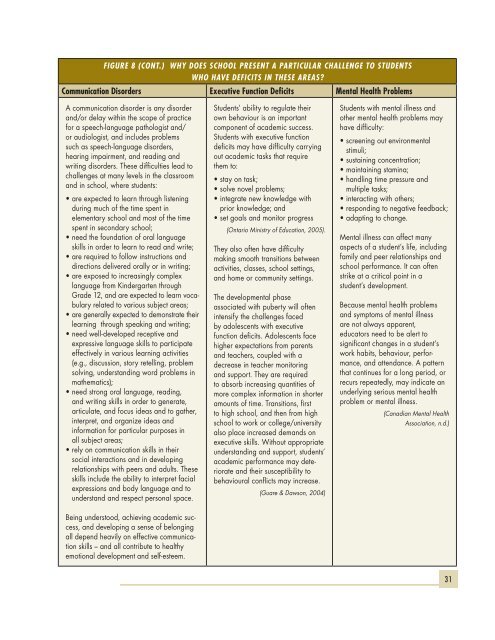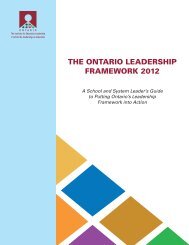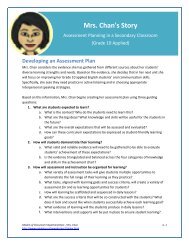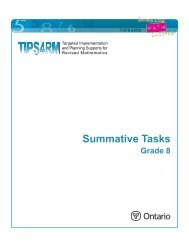Caring Safe Schools Ontario
Caring and Safe Schools in Ontario - Ministry of
Caring and Safe Schools in Ontario - Ministry of
- No tags were found...
Create successful ePaper yourself
Turn your PDF publications into a flip-book with our unique Google optimized e-Paper software.
Figure 8 (cont.) Why does school present a particular challenge to studentswho have deficits in these areas?Communication Disorders Executive Function Deficits Mental Health ProblemsA communication disorder is any disorderand/or delay within the scope of practicefor a speech-language pathologist and/or audiologist, and includes problemssuch as speech-language disorders,hearing impairment, and reading andwriting disorders. These difficulties lead tochallenges at many levels in the classroomand in school, where students:• are expected to learn through listeningduring much of the time spent inelementary school and most of the timespent in secondary school;• need the foundation of oral languageskills in order to learn to read and write;• are required to follow instructions anddirections delivered orally or in writing;• are exposed to increasingly complexlanguage from Kindergarten throughGrade 12, and are expected to learn vocabularyrelated to various subject areas;• are generally expected to demonstrate theirlearning through speaking and writing;• need well-developed receptive andexpressive language skills to participateeffectively in various learning activities(e.g., discussion, story retelling, problemsolving, understanding word problems inmathematics);• need strong oral language, reading,and writing skills in order to generate,articulate, and focus ideas and to gather,interpret, and organize ideas andinformation for particular purposes inall subject areas;• rely on communication skills in theirsocial interactions and in developingrelationships with peers and adults. Theseskills include the ability to interpret facialexpressions and body language and tounderstand and respect personal space.Being understood, achieving academic success,and developing a sense of belongingall depend heavily on effective communicationskills – and all contribute to healthyemotional development and self-esteem.Students’ ability to regulate theirown behaviour is an importantcomponent of academic success.Students with executive functiondeficits may have difficulty carryingout academic tasks that requirethem to:• stay on task;• solve novel problems;• integrate new knowledge withprior knowledge; and• set goals and monitor progress(<strong>Ontario</strong> Ministry of Education, 2005).They also often have difficultymaking smooth transitions betweenactivities, classes, school settings,and home or community settings.The developmental phaseassociated with puberty will oftenintensify the challenges facedby adolescents with executivefunction deficits. Adolescents facehigher expectations from parentsand teachers, coupled with adecrease in teacher monitoringand support. They are requiredto absorb increasing quantities ofmore complex information in shorteramounts of time. Transitions, firstto high school, and then from highschool to work or college/universityalso place increased demands onexecutive skills. Without appropriateunderstanding and support, students’academic performance may deteriorateand their susceptibility tobehavioural conflicts may increase.(Guare & Dawson, 2004)Students with mental illness andother mental health problems mayhave difficulty:• screening out environmentalstimuli;• sustaining concentration;• maintaining stamina;• handling time pressure andmultiple tasks;• interacting with others;• responding to negative feedback;• adapting to change.Mental illness can affect manyaspects of a student’s life, includingfamily and peer relationships andschool performance. It can oftenstrike at a critical point in astudent’s development.Because mental health problemsand symptoms of mental illnessare not always apparent,educators need to be alert tosignificant changes in a student’swork habits, behaviour, performance,and attendance. A patternthat continues for a long period, orrecurs repeatedly, may indicate anunderlying serious mental healthproblem or mental illness.(Canadian Mental HealthAssociation, n.d.)Understanding Student Behaviour31
















